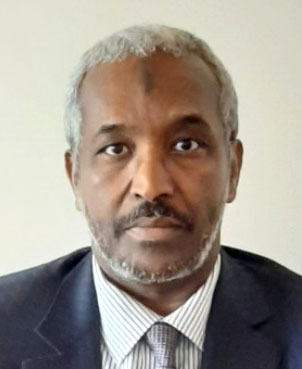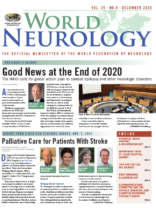By Prof. Osheik Ab’Asha Seidi, MB BS, MRCP (U.K.), ABiM, CCST (U.K.), FRCP

Osheik Ab’Asha Seidi
I was born in a village called Aroma, named by the British for the nice smell of its naturally growing wild roses, in the northeast African country Sudan. My parents could barely read or write, as they did not complete primary school.
My family was large and wanted all their kids to go to school. From the outset, I was required to do many jobs as well as attend school. This included early morning shopping from the local market for fresh vegetables and meat, to the afternoon and evening milking and feeding of our goats and cows.
The educational system in my country of origin, Sudan, was strong and free. So, despite my family’s limited financial abilities, I was blessed by being able to make my way through primary, intermediate, and high schools successfully, eventually ending up in the Faculty of Medicine at the University of Khartoum.
The university was originally opened in 1924 under the name “Lord Kitchener’s School of Medicine” and was linked to the University of London until 1956 when Sudan became independent from British colonization. I graduated with distinctions but soon realized that I would not be able to support my family as the local economy was in complete disarray. I left for Yemen while most of my colleagues expatriated to the Gulf countries.
I managed to make some money in Yemen, reasonably helped my family, got married, and passed part 1 of the MRCP (U.K.). In the early 1990s, I moved to Saudi Arabia as a GP in a remote village that had no electricity, TV transmission, or paved roads. Soon, I was selected after a tough competitive test to join the Arab Board of Internal Medicine residency program in Abha city, in the Asir Region of southwestern Saudi Arabia.
That was a 5-year residency program. Luckily, in my second year of the rotation, I managed to pass the written and clinical parts of the MRCP (U.K.) and soon after obtained my ABiM (Arab Board of Internal Medicine) degree. I was then promoted to consultant physician at age 35, an unusual thing in that setting.
My passion for neurology led me to resign my job in Saudi Arabia and move to the U.K. in 1998, with my supportive wife and three young kids. I started as a senior house officer, but in a few months, I was promoted to clinical lecturer / registrar at Sheffield University Hospitals NHS Foundation Trust.
Still, my ambition was to excel in medical research as well as clinical skills, so I kept an eye on suitable opportunities, until I succeeded in getting a job as a clinical research associate at Guy’s, King’s College, and St. Thomas’ School of Medicine in 2000. There, I discovered new abilities in myself as a researcher and combined basic laboratory research with participation in international randomized clinical trials on many drugs for multiple sclerosis.
I learned a lot from my seniors at the department of neuroimmunology and was particularly influenced by Prof. Richard Hughes and his impressive range of scientific styles and leadership abilities. I worked with many people of extremely high caliber with comprehensive knowledge in medicine and many other sciences Sharing the teamwork of my research committees, I published widely and participated in international neurology conferences as a speaker. The U.K. gave me what I was looking for – opportunities to further discover my personal strengths.
During that time, I became aware of many misconceptions about Black people, particularly those coming from Africa and more so from Sudan when the war in Darfur was at its peak. I had many personal discussions with my colleagues and really felt that I must do something to clear the mist.
I moved to northeast England as a training specialist registrar in neurology, and in Newcastle upon Tyne, I met many Africans, including Dr. Peter Adegbie, an inspiring and kind Christian priest originally from Nigeria. He studied theology and had similar feelings as mine regarding the need to clear the misconceptions about Black Africans. Together, with many other African friends in the northeast of England, we participated in a major project called African Voices, led by Dr. Peter Adgebie and funded by the European Union Fund.
We prepared and carried out a comprehensive program to shine a light on African cultures and peaceful diversity. Training was for all ages, but mainly targeted young people in the U.K. We also prepared a curriculum for children ages 5-9 years with a simple approach to let them have true ideas about Africans. Through the stories and experiences of members of the African diaspora communities in Bristol and Newcastle, this resource aimed to challenge young peoples’ perceptions of African countries and provide opportunities to question the way in which we see our world.
The program was extraordinarily successful, and the teaching resource is widely used.
Over the past 10 years, I have moved back to Sudan and joined the Faculty of Medicine at the University of Khartoum. I progressed to professor of internal medicine and neurology in 2014, and was a founding member for the African Academy of Neurology (AFAN) and acted as the vice president for East Africa on the first steering committee (2015–2017). With the solid support of many colleagues in Sudan, we managed to establish a PACES center in Sudan in 2012, and I have supervised all the MRCP (U.K.) examinations in Sudan from 2010 until now.
I also actively participated in starting the Medical Training Initiative (MTI) and hosted the first trainee from Sudan when I was a consultant in Sunderland, U.K., in 2007. I still help in the selection process of suitable candidates from Sudan with leadership of my colleague, Prof. Alaadin Hassan Ahmed, currently dean of the Faculty of Medicine at the University of Khartoum.
I hope my story will inspire many young Black people and other ambitious people of all colors and walks of life.•
This article is reprinted with permission from the Royal College of Physicians. https://www.rcplondon.ac.uk/news/doctor-can-journey-bedwin-boy-eastern-sudan-professor-neurology
